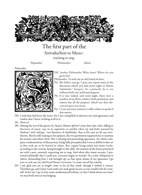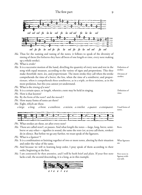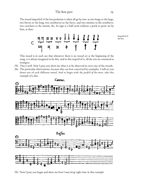Thomas Morley: A Plain and Easy Introduction to Practical Music
More than 400 years after its original publication, this important work is now available in an edition that has all the benefits of both a facsimile and a critical assessment. The text has been edited to conform to modern conventions of grammar, spelling, and punctuation; all obscure words and turns of phrase in English have been explained; all Latin & Greek has been translated and cited; and many other notes have been provided to assist the reader in understanding the text.
The text has been newly laid-out with all the original woodcut engravings and musical illustrations into a design which strives to follow the original closely whilst giving the advantages that modern typography will allow.
Book Specifications: 8 x 11 inches (279 x 203mm); 256pp, with over 420 original illustrations; cased in cloth.
ISBN: 1-902918-10-X
Price: £45.00 GBP. inc. post & packaging within the UK. Postage is extra for overseas: NB: the book weighs 1 Kg.
Click on sample pages:
Quotations
Below are some quotations from the book, showing Thomas Morley's wit and wisdom:
For most of our churchmen (as long as they can cry louder in the choir than their fellows) care for no more: whereas by the contrary, they ought to study how to vowel and sing cleanly, expressing their words with devotion and passion, whereby to draw the hearer by the ears, as it were in chains of gold, to the consideration of holy things. But for the most part, you shall find amongst them those that continue ever so long in the church; yea, after twenty years, they will never study to sing better than they did on the first day of their preferment to that place. So it should seem that, having obtained the living which they sought, they have little or no care at all of either their own credit, or well-discharging that duty whereby they have their maintenance.
Conceit of their own sufficiency has overthrown many who otherwise would have proved excellent. Therefore, in any case, never think so well of yourself, but let other men praise you, if you are praiseworthy: then may you justly take it to yourself, so long as it is done with moderation and without arrogance.
This is the course of the world: that where we think ourselves surest, there are we furthest off from our purpose.
That which you demand requires longer discourse than you look for.
For as so many men have so many minds, so their inventions will be diverse, and diversely inclined. But I would counsel you that you accustom not yourself to put pieces of other men’s doings amongst your own: for by that means the diversity of veins will appear, and you will be laughed to scorn of the skillful for your pains.
But if you chance to find any such thing in their works, you may be bold to impute it to the oversight of the copiers: for in copies passing from hand to hand, a small oversight committed by the first writer, by the second will be made worse, which will give occasion to the third to alter much, both in the words and notes, according as shall seem best to his own judgment, though (God knows) it will be far enough from the meaning of the author. So that errors passing from hand to hand in written copies are easily augmented; but for such of their works as are in print, I dare be bold to affirm that in them no such thing is to be found.
But this is the world: everyone will take it upon himself to write and teach others, none having more need of teaching than himself.



